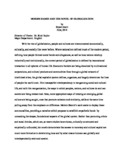MOHSIN HAMID AND THE NOVEL OF GLOBALIZATION
Author
Scott, Bryant
Abstract
With the rise of globalization, people and cultures are interconnected economically, culturally, and socially like never before. Where nationalism defined much of the modern period, defining how people formed social bonds and allegiances, as well as how nations develop industrially and institutionally, the current period of globalization is defined by transnational interaction in all spheres of human life. Economic borders are being dissolved by multinational corporations, and cultural products and commodities flow through a global network of interlinked cities; the global capitalist system defines, organizes, and largely determines the lives of people the world over. This inescapable interdependency is reorganizing social and cultural life, and with this reorganization, the ways in which peoples, nations, and cultures do and can coexist are being reexamined. New, more appropriate ways of viewing an emerging global culture are being sought, ones that promote cohesion and similarity, while at the same time pulling away from the emphasis on difference. Mohsin Hamid's work seeks to display these commonalities, providing a narrative which proposes to establish empathetic bonds by unmasking the deeper, foundational aspects of the global system. Rather than promoting ethnic and racial divides, which are, as recent studies have shown, culturally constructed and empirically unfounded, his novels demonstrate that access to monetary and cultural capital are much more formative in determining how and by what means humans can globally and interdependently exist and coexist.
Date
2014
Citation:
APA:
Scott, Bryant.
(January 2014).
MOHSIN HAMID AND THE NOVEL OF GLOBALIZATION
(Master's Thesis, East Carolina University). Retrieved from the Scholarship.
(http://hdl.handle.net/10342/4568.)
MLA:
Scott, Bryant.
MOHSIN HAMID AND THE NOVEL OF GLOBALIZATION.
Master's Thesis. East Carolina University,
January 2014. The Scholarship.
http://hdl.handle.net/10342/4568.
May 09, 2024.
Chicago:
Scott, Bryant,
“MOHSIN HAMID AND THE NOVEL OF GLOBALIZATION”
(Master's Thesis., East Carolina University,
January 2014).
AMA:
Scott, Bryant.
MOHSIN HAMID AND THE NOVEL OF GLOBALIZATION
[Master's Thesis]. Greenville, NC: East Carolina University;
January 2014.
Collections
Publisher
East Carolina University

